Training a Rottweiler during the critical 5-month mark takes patience, consistency and an understanding of canine developmental stages. Unlike smaller breeds that mature faster, Rottweilers grow rapidly in the first year, making this period pivotal for reinforcing good behaviors before bad habits set in.
With their large size, intelligence and guarding solid instincts, properly training a 5-month-old Rottweiler prevents problematic behaviors from developing while allowing their natural abilities to shine through positive outlets like organized dog sports.
This article provides a comprehensive guide on foundational training areas, from basic commands to social skills that transform your adorable Rottweiler pup into a well-mannered companion.
Why Starting Training at Your 5-Month-Old Rottweiler’s Age is Critical.
The adage “you can’t teach an old dog new tricks” exists for a reason. 5-month-old Rottweiler puppies rapidly absorb new information as their brains develop critical neural pathways. This prime learning period generally lasts until 8 months of age.
Reinforcing good manners through clear, reward-based training during this window prevents problems from escalating into ingrained bad habits later. It also strengthens your lifelong bond built on mutual communication and respect.
Here are vital reasons prioritizing training now pays dividends down the road:
Rapid Growth Spurt
Between 5 and 8 months, your Rottweiler puppy will double in size, gaining, on average, 15 to 20 pounds per month. This astonishing growth rate means they need ample nutrition, appropriate exercise, and training for healthy development.
Brain Development
The canine brain doesn’t reach full maturity until 12-24 months. Your puppy’s sponge-like capacity for learning makes setting a solid training foundation essential. They will rapidly absorb new behaviors you reinforce now.
Preventing Problem Behaviors
Proactively teaching good manners prevents bad habits from taking root. It’s always easier to reinforce desired behaviors from the start than correct ingrained issues later through retraining.
Lifelong Impacts
How you raise your Rottweiler in the first year impacts their temperament for life. Reward-based training focused on positive behaviors sets them up for success as good canine citizens.
Prioritizing your 5-month-old Rottweiler’s training now enhances your bond through clear communication built on mutual trust and respect. Consistency transforms natural abilities into lifelong good behaviors.
Laying the Groundwork with Basic Commands for Your 5-Month-Old Rottweiler
Building block commands like sit, down, stay and come lay the foundation for a well-trained Rottweiler. Start training sessions in low-distraction areas, using treats and praise to reward your puppy for responding to cues. Keep lessons short and upbeat, as their attention spans remain limited at this age.
Here are fundamental techniques for basic command training:
Teaching Your 5-Month-Old Rottweiler to Sit
The sit command teaches impulse control, a key ingredient in good manners. Rottweiler puppies generally catch on quickly with reward-based methods:
Step 1: Show your puppy the treat/toy reward to capture their attention.
Step 2: Slowly raise the lure above their head until their butt touches the ground in a sitting position.
Step 3: Immediately reward, pairing verbal praise like “Good sit!” with the treat.
Once your puppy connects the verbal cue “sit” with the action, phase out food lures to hand signals over time. Randomly ask for a seat throughout your day using the command and hand signal without any lures to reinforce it.
Pro tip: Avoid repetitive drills, keeping lessons short and rewarding to keep your Rottweiler engaged.
Training Your 5-Month-Old Rottweiler to Down
The down command builds on the sit cue, teaching your Rottweiler to settle on the cue fully. Maintaining down positions for extended time teaches patience and impulse control.
There are two main ways to train it:
Luring Method
- Start from the sitting position
- Show your puppy the reward at nose level
- Slowly bring it down between their paws, leading their head to follow until they lie down
- Reward/praise immediately once they complete the action
Capturing Method
- Simply wait until your puppy lies down naturally
- Immediately reward the behavior with enthusiastic praise
- Repeat this capture and reward several times
- Eventually, add the verbal “down” command right as they start to lie down
The capturing method works well for intelligent breeds like Rottweilers, who quickly connect your verbal cue and the desired behavior with positive reinforcement.
Pro Tip: Kneel to their level rather than bending over them to elicit downs. Going overhead can seem threatening, making some resist.
Stay Commands for Your 5-Month-Old Rottweiler.
Stay cues require your Rottweiler to maintain their position until released. This teaches patience and impulse control.
Steps to train it include:
Step 1: Have your puppy sit or lie down. Stand before them with an open palm facing out in a “halt” signal.
Step 2: Take one giant step back as you firmly yet calmly say, “stay.”
Step 3: If they break, quickly step back into place and repeat guiding back into position with a sit/down command paired with the stay cue.
Step 4: Release with an “OK!” after just 2-3 seconds to start. Gradually build duration, adding a few extra seconds to each session if they hold the stay reliably.
Randomly practice sit/down stay cues throughout the day, always rewarding stays to reinforce it. You can also extend stay duration by chaining several commands together (sit > down > sit > stay). Mastering extended stay commands leads to better impulse control.
Pro Tip: Until solid stay duration, practice in low distraction environments first, only adding distractions like toys or treats once mastered.
Come Commands for Your 5-Month-Old Rottweiler.
A reliable recall or command can save your Rottweiler’s life if they escape or chase after something dangerous. Early recall training using rewards develops a strong response when called later as an adult. Steps include:
Step 1: Start training with a 6-10 foot leash attached and let them wander away while calling their name excitedly. Quickly run backward, encouraging them to catch you.
Step 2: The second they turn towards you to come, immediately praise and reward. As they hurry back, continue rewarding them with treats/praise.
Step 3: Repeat randomly throughout the day, gradually increasing distance and adding distractions like toys or playmates once the response is solid in low-distraction environments.
Step 4: Practice recall cues hiding behind objects or when engaged in play. Switch up “come” with “here.” Vary your tone/body language to prevent habituation. Reinforce rapid responses by excusing yourself and adding extra rewards when they run over.
Pro Tip: Never call your Rottweiler to you for something unpleasant like nail trims or end of play. This erodes their motivation to come when called. Always make it rewarding!
Regularly practicing foundation cues like sit, down, stay and come using reward methods and consistency cements good behaviors in your growing Rottweiler. Keep lessons short, upbeat engaging tailored to their young attention spans.
Mastering Leash Manners with Your 5-Month-Old Rottweiler
Leash skills like loose walking, greeting politely or ignoring distractions transform your Rottweiler puppy into a canine good citizen. Maintaining control via their leash keeps them safe while preventing bad manners. Steps for mastering key areas include:
Loose Leash Walking with Your 5-Month-Old Rottweiler
Pulling is a top frustration for Rottweiler owners, leading to unsafe situations. Use incentive techniques to motivate your puppy, like the stop/start method:
Step 1: Equip with an adequately fitted flat collar or front-clip harness preventing escape. Hold treats visible in one hand while keeping the leash loose in the other.
Step 2: Start walking. The second they pull ahead, they firmly stop movement without jerking back.
Step 3: Wait for a leash to slack, then enthusiastically praise/treat before immediately moving again.
Step 4: Quickly stop any time the leash tightens. Reward slack leash heavily. Gradually expect longer durations of loose leash as they master it.
Adding rewards for focusing on you periodically helps reinforce the habit of checking in while walking. Use praise, treat tosses ahead, or fun play breaks as incentives for keeping a slack leash. Stay upbeat, positive and patient!
Greetings Manners for Your 5-Month-Old Rottweiler
Jumping seems cute initially, but it can scare strangers and children or knock people over, leading to traumatic bites or accidental injuries.
Instead, reinforce:
Step 1: Before approaching people/dogs, have your puppy sit automatically through prior training.
Step 2: If they break their seat while staying seated, the body blocks their attempts to jump while repeating the sit command. Praise the instant they sit.
Step 3: Once seated calmly, allow greetings, keeping the leash secured until they master impulse control. If over-excited, have strangers ignore until settled.
Teaching polite manners prevents terrible habits. Use your leash to control and reward desired behaviors. Strangers should help reinforce by greeting only once your Rottweiler puppy sits calmly.
Ignoring Distractions for Your 5-Month-Old Rottweiler
Rottweiler puppies naturally want to investigate anything novel. Maintain structure by focusing on you until released through an obedience cue like “free dog.” Steps include:
Step 1: When passing distractions like strangers or dogs, get attention by calling their names/showing treats.
Step 2: Reward focus on you, pairing praise and treats for checking in. Release to “go say hi” once calm and focused.
Step 3: For high distraction areas, maintain closer proximity with more frequent rewards for attention on you, not the environment.
Step 4: Remove/comfort if over the threshold. Slowly expose from a greater distance while reinforcing check-ins.
Use praise, play and life rewards like greetings to master impulse control around exciting distractions. This builds reliability off-leash long-term.
Pro Tip: If greetings ramp them up, politely ask strangers to ignore them while rewarding calm behavior.
Applying structure, patience and rewards transforms regular leash walks into positive outlets, improving manners. Set clear expectations using proper equipment fitted for growing Rottweiler puppies.
Prevent rehearsing poor habits by managing situations and reinforcing check-ins with you first before releasing to explore.
Importance of Continued Socialization for Your 5-Month-Old Rottweiler
Socialization is the lifelong process of exposing your Rottweiler to new sights, sounds, people, animals and environments to build confidence. Continue proper socialization by:
Facilitating Positive Experiences for Your 5-Month-Old Rottweiler
5-12 weeks old is the prime window for early socialization when introducing novel things. Now is not too late! Expand your puppy’s world through positive new encounters:
People: Invite diverse groups of visitor friends over. Include ages from school kids and adults to the elderly. Reward calm greetings once the puppy sits politely.
Environments: Explore new surfaces, sights and sounds through structured field trips to parks or stores that allow dogs. Pair with focus/obedience training.
Animals: Orchestrate play dates with friendly, vaccinated puppies or tolerant adult dogs. Reinforce appropriate interactions.
Handling: Massage paws, ears and mouth daily. Pair with treats to teach handling for grooming/vet care. Desensitize to nail trims.
Prevent adverse reactions by monitoring comfort levels, keeping exposures gradual and pairing high rewards for bravery. Provide escapes if overwhelmed. Create lifelong confidence through kindness and patience!
Providing Mental Stimulation for Your 5-Month-Old Rottweiler
Physical exercise alone doesn’t cut it for brilliant working breeds like Rottweilers. Mental stimulation prevents destructive boredom behaviors from erupting.
5-10 minutes of focused training interspersed throughout your day keeps them learning. Cycle through foundation cues plus new tricks like spin, circle, bow or “bang” tricks.
Food puzzle feeders like the Kong or puzzle toys force natural foraging, working their minds. Provide these when leaving your puppy for short periods alone to prevent boredom-related issues like destruction or excessive barking from developing. Rotate puzzles to prevent habituation.
Chews like frozen carrots, safe digestible bovine ears or rubber teethers soothe teething discomfort in growing puppy teeth while occupying free time.
Mental stimulation requires creative solutions – avoid stagnation! Maintain an inquisitive environment, providing learning opportunities tailored to developmental stages. This nourishes your Rottweiler puppy’s body, mind and spirit.
Managing Exercise Needs of Your 5-Month-Old Rottweiler
Proper exercise prevents unwanted behaviors from erupting down the road. Use a balanced blend catered to developmental abilities.
Consider daily minimums:
45-60 minutes combining walks, free play, or puppy socialization off-leash sessions. Puppies have lower endurance for continuous walks, so break into multiple sessions.
1-2 longer lead walks for leash skills training. Bring high-reward treats. Keep moving to avoid frustration from puppy distractions.
15+ minutes daily free play/running intervals. Games like fetch or structured recall practice tap into natural athletic drives when paired with commands. Supervise to prevent excessive jumping on developing joints.
Signs your Rottweiler puppy is getting adequate physical activity levels:
- Settles reasonably when resting
- Chews appropriate items
- Sleeps soundly
Growing Rottweiler puppies need enough outlets for energy without overexertion. Provide structured physical and mental exercise opportunities to nurture your puppy’s best potential.
Training your Rottweiler in these pivotal developmental months requires insight, patience and consistency tailored to canine stages.
Set your impressionable puppy up for success by focusing on positive behaviors now, preventing problems later while building your lifelong bond. Their future starts today.
Conclusion
Listen, training your Rottweiler pup at that critical 5-8 month stage plants the seeds for a lifetime of good behavior. It’s their ideal time for learning – kinda like little absorbent doggy sponges just waiting to soak up knowledge!
Lay that sturdy foundation now through teaching commands in short, reward-based sessions to match young puppy attention spans.
Keep exposing them to new experiences and people, too. It builds confidence big time when done right! Oh, and don’t skip practicing those on-leash walking skills. Stop problems like pulling before they start by being consistent with training.
And don’t forget to play brain games and provide some solid exercise daily to run a smarty-pants working breed like a Rottie!
Do the work at 5 months when they’re ripe for training, and I promise you’ll reap the rewards down the road with a better-bonded bud.
Put in the effort now to regain their fantastic potential for years. It’s so worth it, I swear! You’ll have one happy dog – and be thrilled, too!
The investment pays off for years through a better bonded, trusting relationship built on communication, respect and fun. Training a lifestyle creates healthy, happy dogs and fulfilled owners sharing their lives.

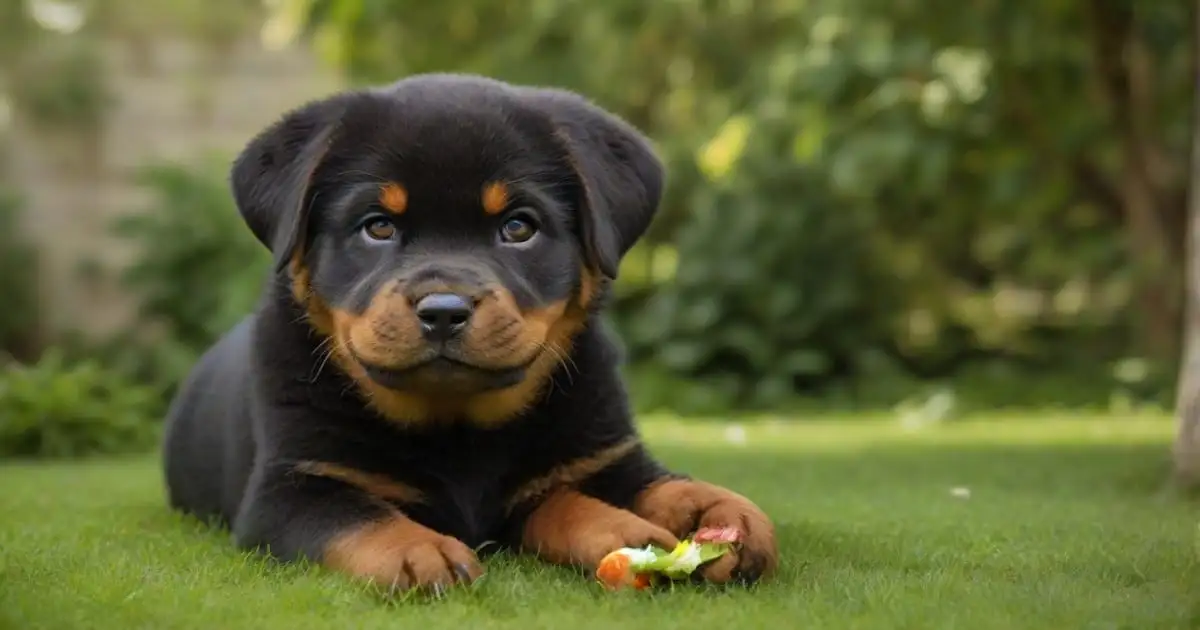
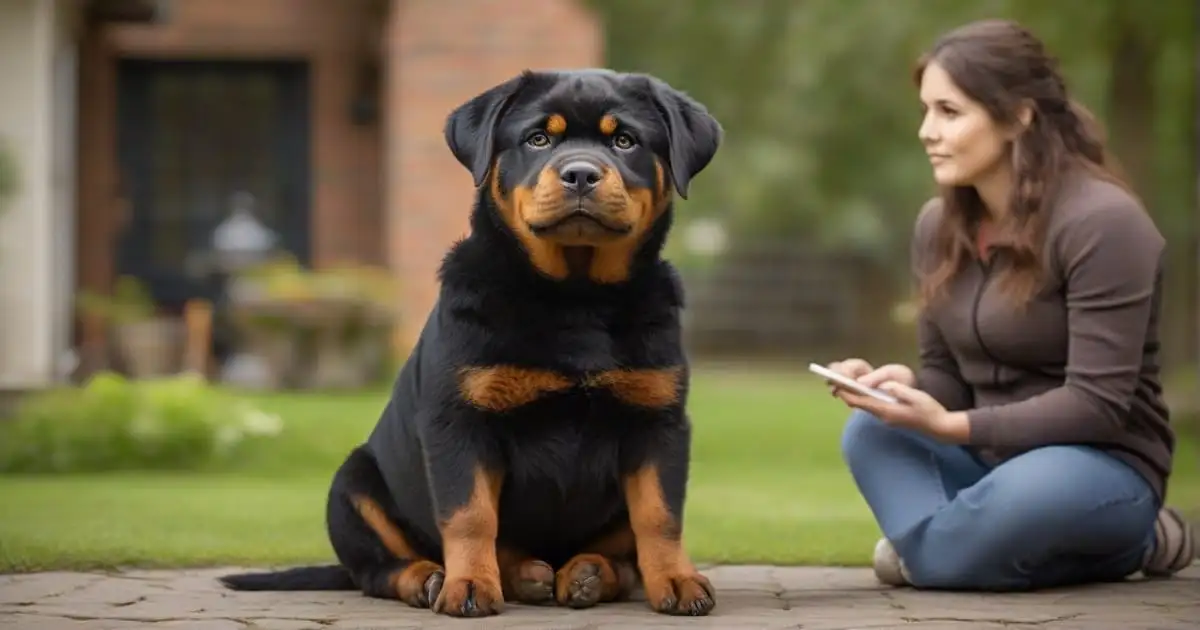
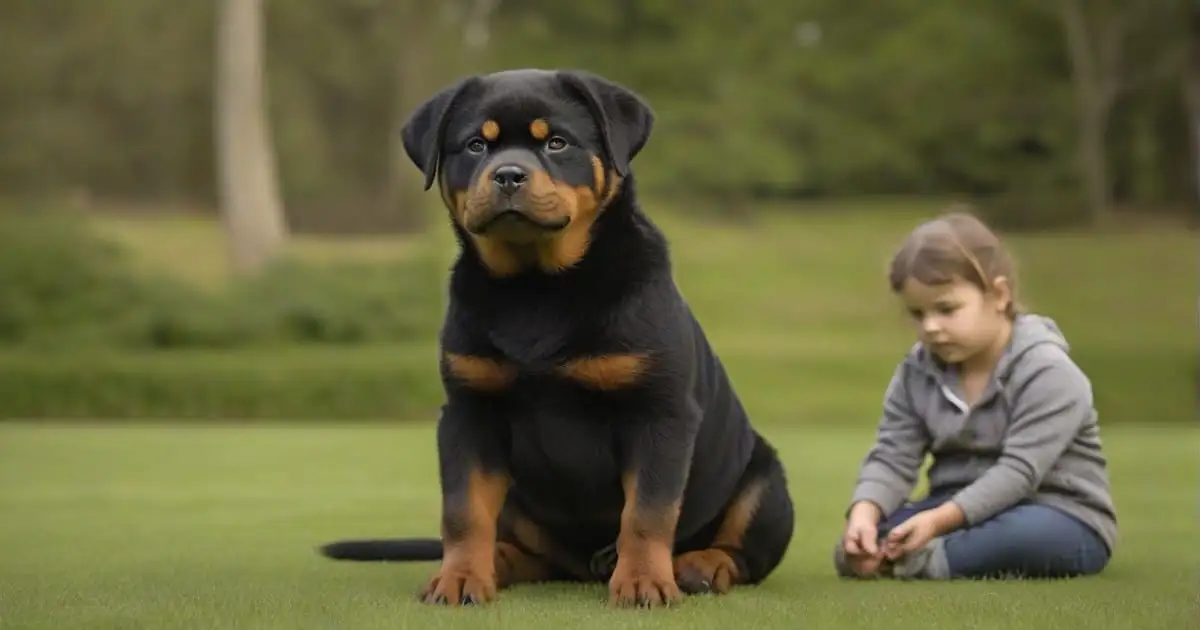
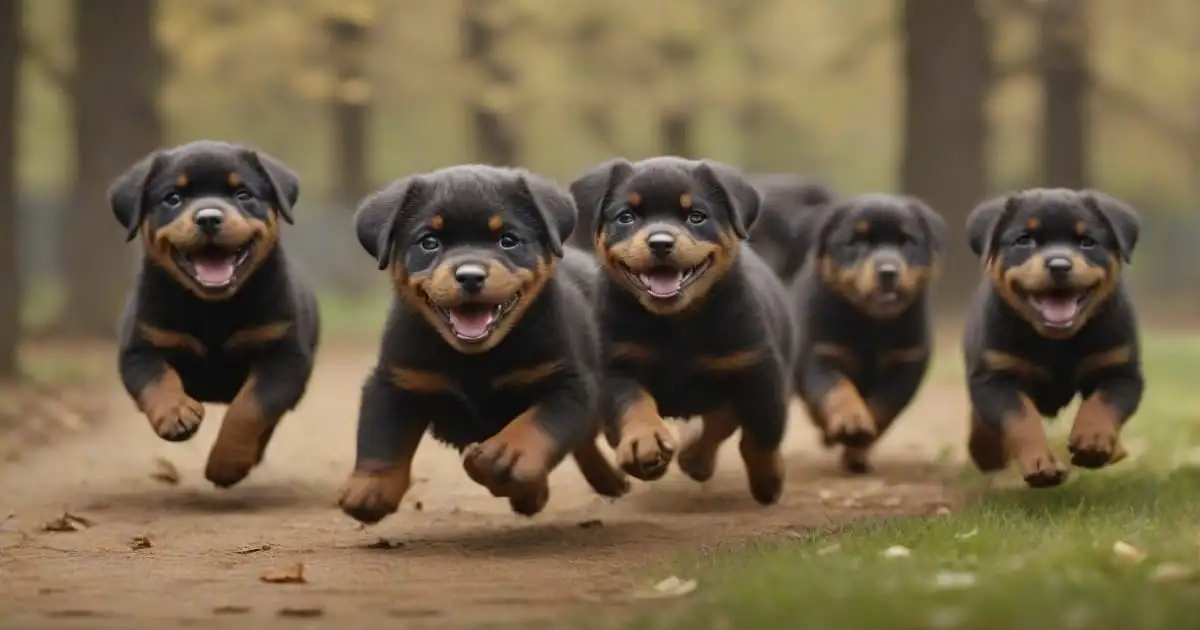
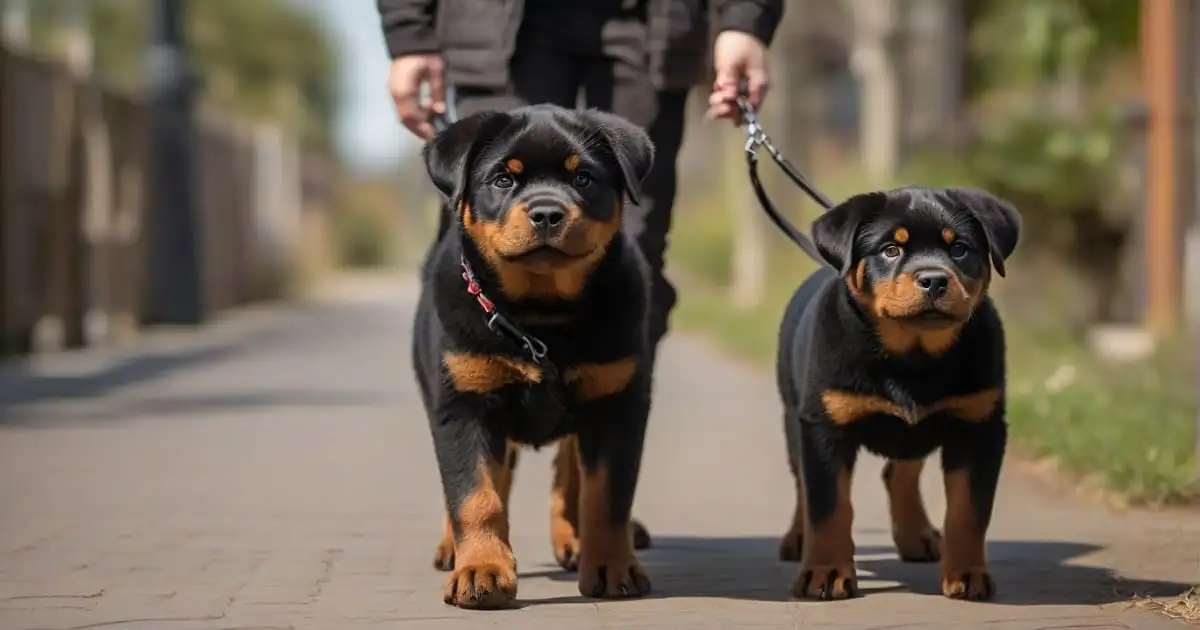
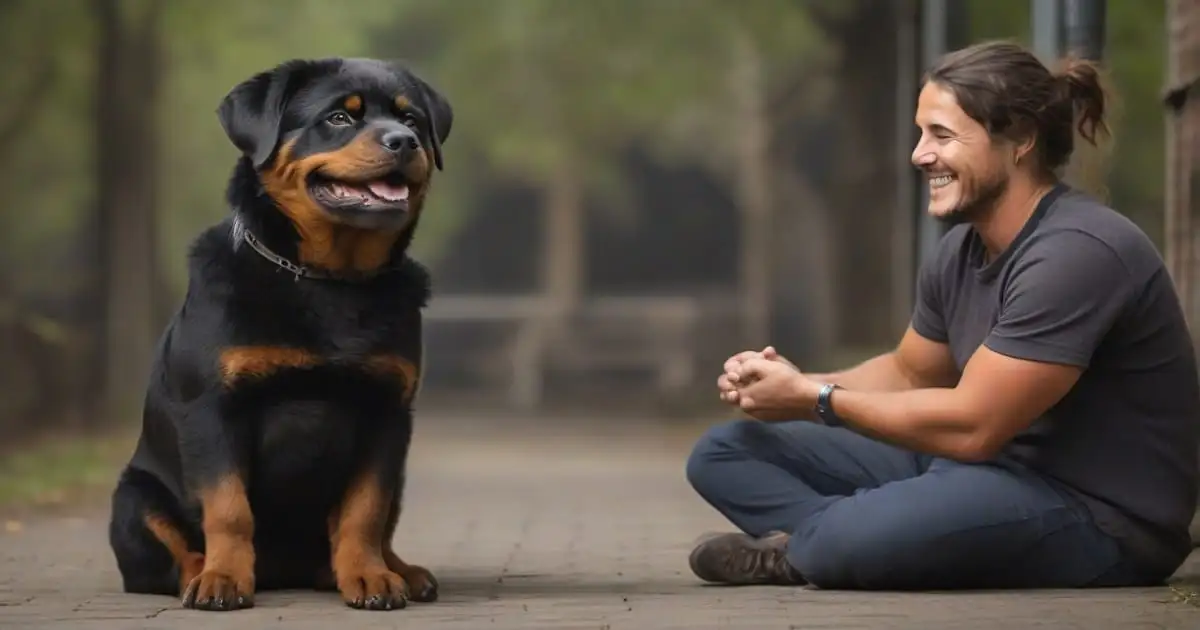
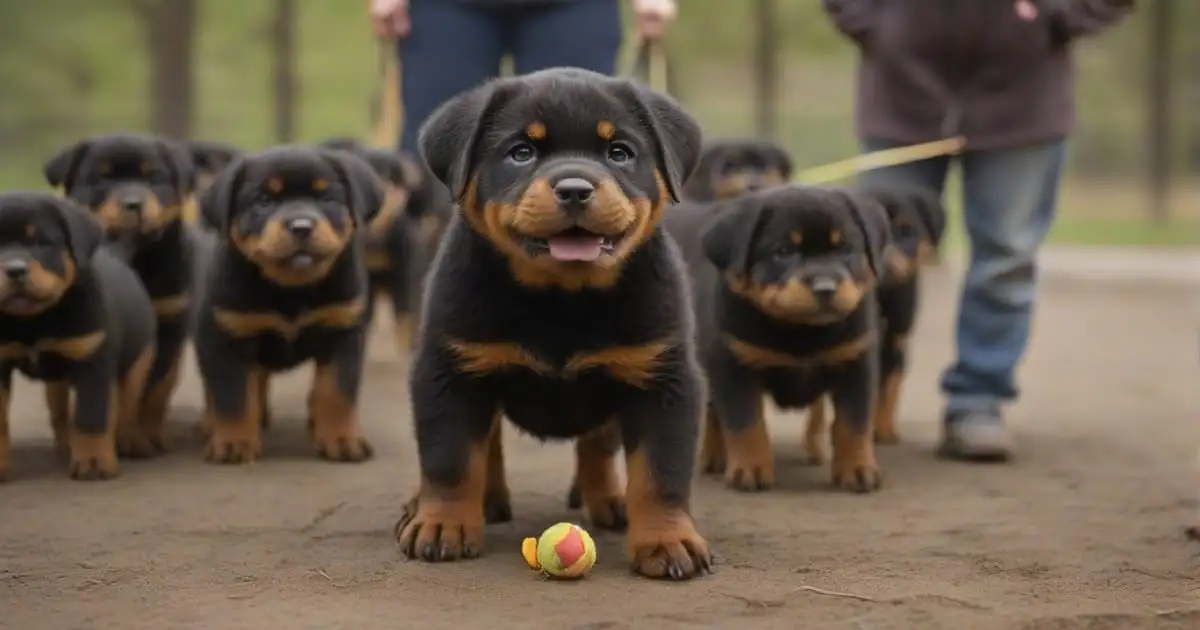
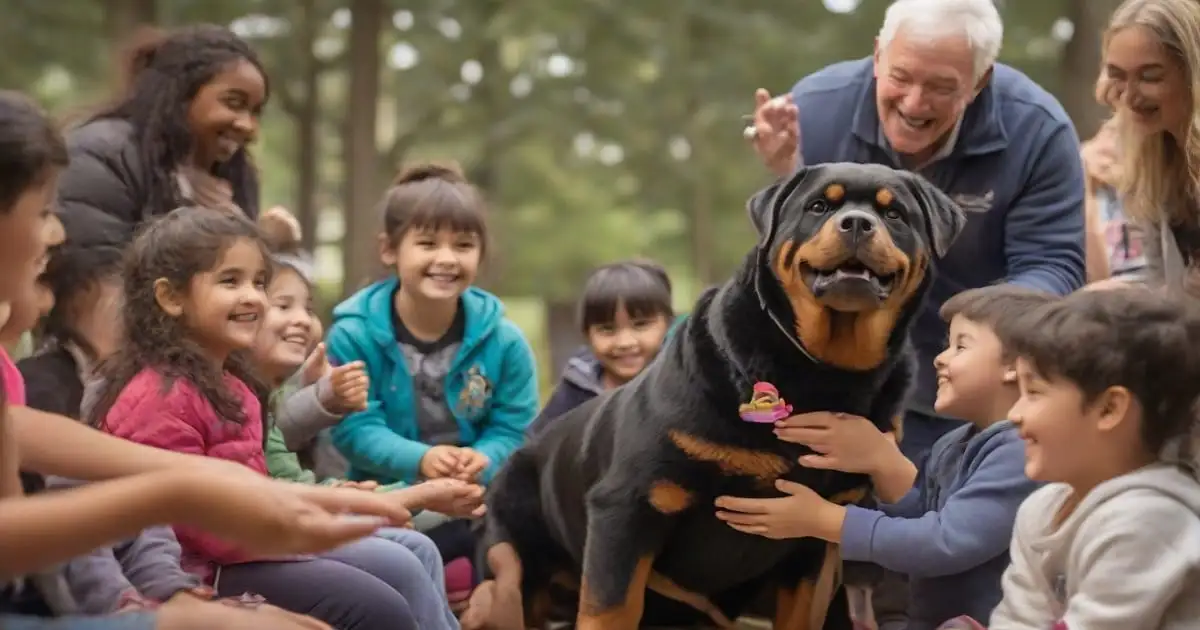
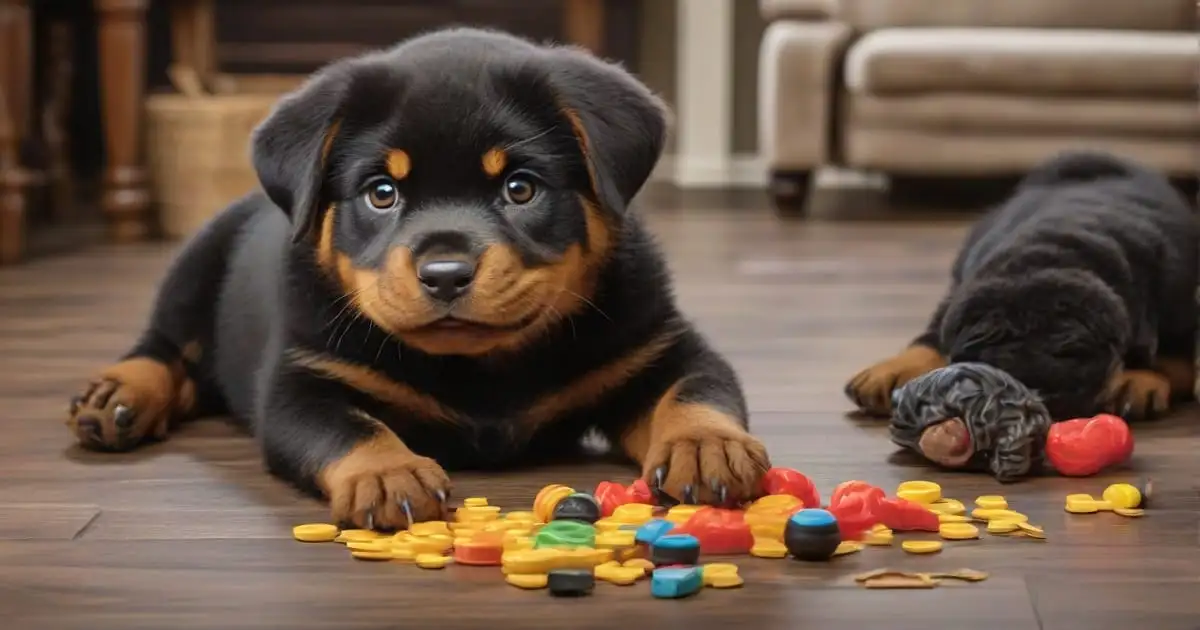
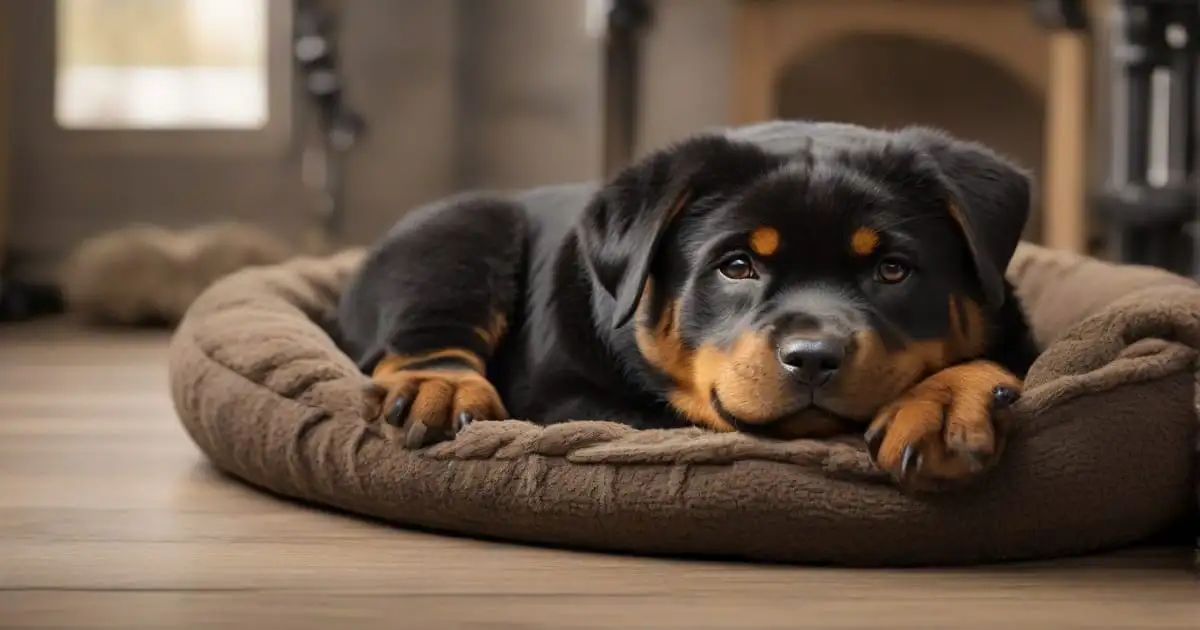


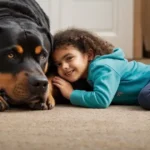
1 thought on “Building a Strong Foundation: Training Tips for Your 5-Month-Old Rottweiler”